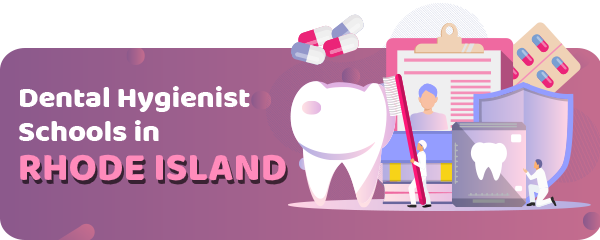The demand for dental hygienists seems to be on the rise in Rhode Island, thus now being a good time to enter this field.
These professionals need a license issued by the Rhode Island Board of Examiners in Dentistry, and those interested to know more about the process should read on.
Article Table of Contents
Dental Hygienist Training
Dental hygienists must train in schools that received accreditation from the Commission on Dental Accreditation (CODA).
An associates’ degree is the minimum educational level accepted for future dental hygienists.
The programs designed for this career have courses such as the following:
- Dental health careers
- Dental and oral anatomy
- Oral communication
- Intro to microbiology
- Community dental health
- Pathology
- Human anatomy and physiology
- Oral histology and embryology
- Oral radiography
- Periodontics
- Dental hygiene
- Materials and tools for dental hygienists
- Clinical dental hygiene
Individuals should know that as a dental hygienist, they have limited functions and that they need special permits in order to perform certain procedures.
To obtain these permits, individuals need to attend special classes while in training.
| School Name | Address |
|---|---|
| Community College of Rhode Island | 400 East Ave, Warwick, Rhode Island 02886-1807 |
Local Anesthesia Permit
The coursework for this permit has at least 20 didactic hours and 12 clinical hours.
The classes include:
- Neurophysiology of pain and pain control
- Dental and medical history assessment
- Assembly and handling of a syringe
- Injection techniques
- Pharmacology of local anesthetic solutions and drug interactions
- Local and systemic complications
- Dental and medical emergency management
Nitrous Oxide Permit
Those who want to administer nitrous oxide need to attend at least 4 didactic and 4 clinical hours for this specific task.
They will learn about:
- Nitrous oxide techniques
- Selection of pain control modalities
- Nitrous oxide analgesia medical emergency techniques
- Pharmacology of nitrous oxide
Passing the Exams
Everyone has to pass a minimum of 2 exams before being issued a license:
- National Board Dental Hygiene Examination (NBDHE)
- Commission on Dental Competency Assessments (CDCA) Examination
NBDHE Exam
The NBDHE is organized by the Joint Commission on National Dental Examination (JCNDE) at the Pearson Vue testing centers.
This test has 350 questions, 2 components and costs $400.
The questions cover topics such as:
- The scientific basis for dental hygiene practice
- Community research and health principles
- Provision of clinical dental hygiene services
- Professional responsibility
- Use of preventive agents
- Managing and planning dental hygiene care
- Assessment of patient characteristics
- Supportive treatment service
- Interpreting and obtaining Xrays
- Performance of periodontal procedures
The Rhode Island Board of Examiners in Dentistry also accepts exams offered by other testing agencies as long as they’re similar to the NBDHE.
CDCA Exam
This exam has 2 parts as well:
- Computer Simulated Clinical Examination (CSCE)
- Patient Treatment Clinical Examination (PTCE)
CDCA also offers the exams for the local anesthesia and nitrous oxide permits.
Other Exams
The Board also accepts the exams offered by the following agencies:
- Central Regional Dental Testing Service
- Southern Regional Testing Agency
- Western Regional Examining Board
However, those who passed one of these exams will still need to sit through the 2 hours long CSCE.
License Application
Individuals who passed the above exams can fill out the license application form.
This paper has to be accompanied by the following:
- $65 – application fee
- Recent photo
- Birth certificate
- Official transcripts from the school
- All exam results from the respective agencies
- Current Basic Cardiac Life Support certification
Those who obtained a dental hygiene license in a different state need to send verification for that as well.
Optional Additional Permit Applications
The license application can be used to obtain permits for the application of local anesthesia and of nitrous oxide.
The following extra documents are needed:
- The fee for the permit
- Proof of passing the respective CDCA exam
- Official transcripts for the respective courses
Each permit costs $70.
Salary Information
Based on the degree one earned as well as other factors, the salary a dental hygienist receives can be higher than the average shown below.
Annual Salary Range:| Location | Avg. Annual Salary |
|---|---|
| Providence | $79,319 |
| Cranston | $79,319 |
| Warwick | $79,319 |
| Pawtucket | $79,319 |
| East Providence | $79,319 |
| Woonsocket | $79,245 |
| Cumberland | $79,319 |
| Coventry | $79,170 |
| North Providence | $79,319 |
| Johnston | $79,319 |
Regional Salary in Rhode Island
| Region | Employed | Avg. Annual Salary | Avg. Hourly Pay | Top 10% Annual Salary | Bottom 10% Annual Salary |
|---|---|---|---|---|---|
| Providence-Warwick, RI-MA | 990 | $82,310 | $39.57 | $94,590 | $78,150 |
* Employment conditions in your area may vary.
License Renewal
In Rhode Island, the dental hygienist licenses expire every May 1st of even-numbered years.
To renew it, individuals have to complete at least 20 hours of continuing education that is relevant to the field of dental hygiene.
OSHA (Occupational Safety and Health Administration) requires professionals to include in their continuing education, Blood Borne Pathogens for at least 1 hour per year.
Keeping a current Basic Cardiac Life Support certification is another requirement for license renewal in the State of Rhode Island.
Read the full guide: How to Become a Dental Hygienist
